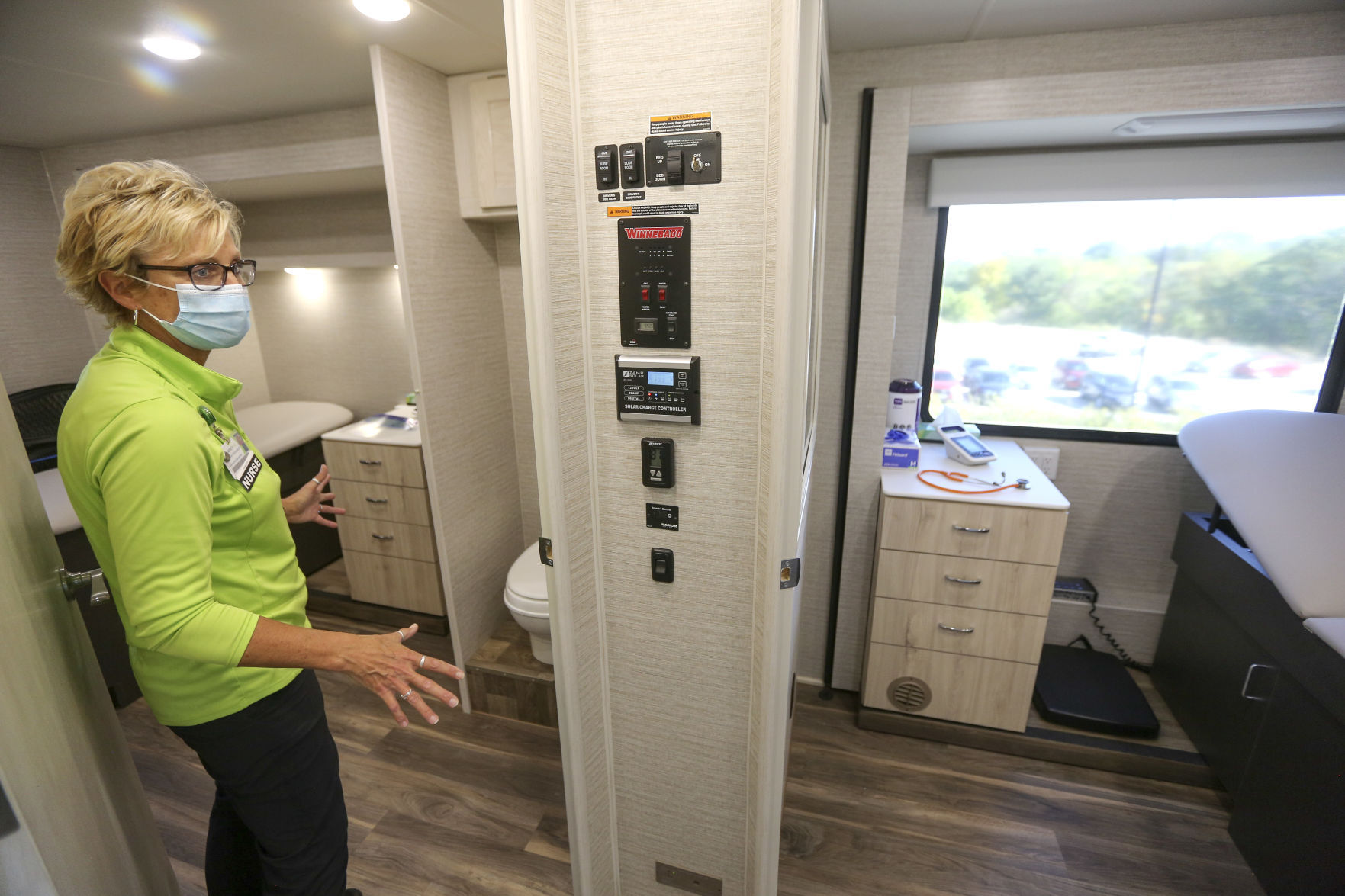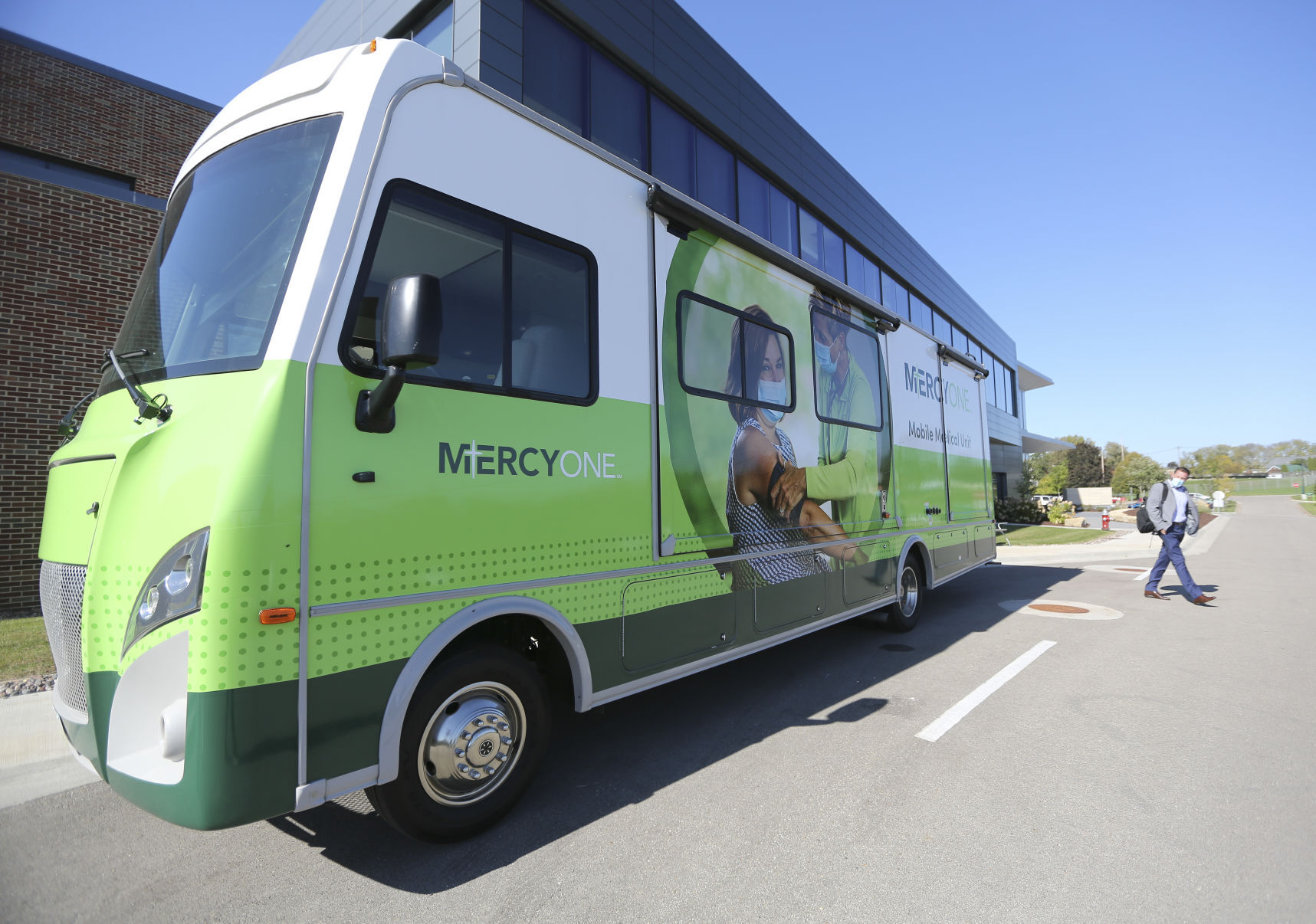MercyOne Eastern Iowa leaders in Dubuque on Monday unveiled a mobile medical unit that will help bring care to underserved populations in rural and urban locations.
The mobile unit looks like a large recreational vehicle, wrapped in MercyOne logos and an image of a nurse administering a vaccine to a masked patient. Inside is an intake station and two full exam rooms.
The mobile unit has been in the works for more than five years. It was made possible in part by a $250,000 grant from Trinity Health’s Preserving Our Legacy fund.
Early on, it will be used for COVID-19 vaccines and flu shots, but also general wellness assessments and brain health care wherever the need is.
Michelle Arensdorf, MercyOne Dubuque Medical Center community education and wellness coordinator and a registered nurse, will head the program. She said the unit will go a long way to reaching people who need access, without duplicating services.
“Our focus is the underserved, the underinsured,” she said. “We’re complementing the community partners who are already doing stuff. Crescent (Community Health Center), Resources Unite, others already have great services. Our goal is to go to them and piggyback — say, ‘What area aren’t you reaching? Is there a certain area we can help you with?’”
Arensdorf said neighborhoods with language barriers, transportation barriers or homeless populations stand out as early needs in urban areas.
Homeless populations in particular, Arensdorf said, typically experience unique problems which can be solved by mobile units.
“A lot of homeless care is getting back to our days of washing feet, almost biblical,” she said. “Foot care is a big issue with a lot of mobile units across the country. That’s their wheels, essentially. If we can keep their feet healthy and their toes, take a podiatrist out there with us.”
In rural areas, too, from Bellevue to Guttenberg, west to Delaware County, the need is significant. Arensdorf said a lot of work will have to go into outreach in the beginning.
“Our first couple of months will be getting out to the community, getting out to some events that are already in place, so people can get to trust us,” she said. “You can’t just pull into a neighborhood and expect people to come. Especially the population we’re after, a lot of them don’t trust health care. Our goal is to help those people that don’t.”
Arensdorf also sees a chance to bridge the gap between body and brain health.
“If we’re going out and giving flu shots or boosters for kids, we can start with the brain health and fit that in, because it affects everything people do,” she said. “With kids, the anxiety they’re all dealing with, we want to normalize that and get them to know everyone’s feelings this way. It’s not just me. We can stop that from being a crisis after high school.”
While the COVID-19 pandemic delayed the rollout of the mobile unit, now is the right time for it, according to Malissa Sprenger, vice president for mission integration for MercyOne’s eastern region.
“It’s here at a time where our community needs it most,” she said. “People have put their wellness on hold and have not had their preventative screenings. This is a symbol of this being the time to be taking care of yourself.”
President of MercyOne Eastern Iowa Kay Takes said the unit also offers a great deal of flexibility, allowing it to adapt to different needs.
“There’s good capability to evolve with it, learn from the community what they need so we can deliver that service,” she said. “There’s plenty of need. It will be focused on how we can improve the care.”
Arensdorf said mobile units are a growing national trend, but likened MercyOne’s to a spiritual descendant of traveling physicians from olden days.
Sprenger said the mobile unit is consistent with MercyOne’s founding principles established by the Religious Sisters of Mercy order.
The mobile unit has no set schedule yet, but officials will set up times at public events and other clinics soon.



